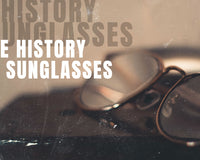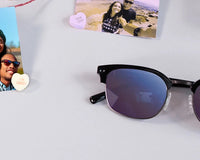Most people who choose eyeglass frames are concerned with price and style. But there are other factors to consider, such as how lightweight, strong, flexible and corrosion-resistant the frames are.

Today's eyeglass frames are made from many types of plastic and metal. Some frames combine materials—for example, a frame with plastic surrounding the lenses and temple pieces made from titanium. Different materials will be right for different people and situations, according to Devin Harrison, MD, an ophthalmologist at Columbia River Eye Center in Richland, WA.
Metal Frames

In general, frames made from metal, titanium or alloys (a mixture of metals) stand up well to wear and tear.
Here are the type of metal frames that is popularly used today:
Titanium
Frames are very strong, lightweight and corrosion-resistant. They are hypoallergenic – an important consideration for people who are allergic to certain metals, such as nickel. These frames can be a good choice for older children, because they are sturdy. Titanium frames come in a variety of colors.
Monel
A mixture of metals. While these frames may have nickel or other metals that can cause allergic reactions in some people with sensitive skin, Dr. Harrison says most monel frames have a coating to protect the skin. Monel frames are quite flexible and corrosion-resistant.
Beryllium
Costs less than titanium, and is very lightweight and strong. It is also flexible, making it easy for the optician to adjust them. Beryllium is extremely corrosion-resistant, Dr. Harrison says. These frames can be a good choice for people who spend a lot of time in or around salt water. Beryllium frames come in many colors.
Stainless
Steel frames are lightweight and strong, but not as light as titanium. They can be less expensive than other metal frames and are corrosion-resistant.
Flexon
As the name suggests, is a very flexible material. Flexon is an alloy of titanium, which comes back into shape even after it is twisted or bent. These frames are lightweight, corrosion-resistant and hypoallergenic. “These frames are great for active kids,” Dr. Harrison says.
Aluminum
Sometimes used in high-end frames. It is corrosion-resistant, flexible and strong.
Plastic Frames

Plastic frames are the most popular choice, because they usually are less expensive, are lightweight and come in a variety of colors and styles. "While plastic frames tend to be cheaper, designer brands can get pricey," Dr. Harrison says.
He recommends plastic frames for infants and small children, who are hard on frames. A disadvantage of plastic frames is that they break more easily than metal frames. "With time, the color can fade slightly, and their strength may decrease a bit," Dr. Harrison notes.
Types of plastic frames include:
Zyl (zylonite, or cellulose acetate)
Is inexpensive and lightweight, and comes in many colors. Zyl frames are easy for an optician to adjust.
Cellulose Acetate Propionate
is a lightweight, nylon-based plastic that is hypoallergenic. It can be a little softer than other plastic frames.
Blended Nylon
Frames are strong and lightweight, and are a popular choice for sports or safety frames. Nylon frames are often found in wraparound styles, because they are easily molded.
Optyl
Is a brand of epoxy resin. When heated, it becomes very malleable, making it easy for the optician to mold the frame to the shape of your face.










